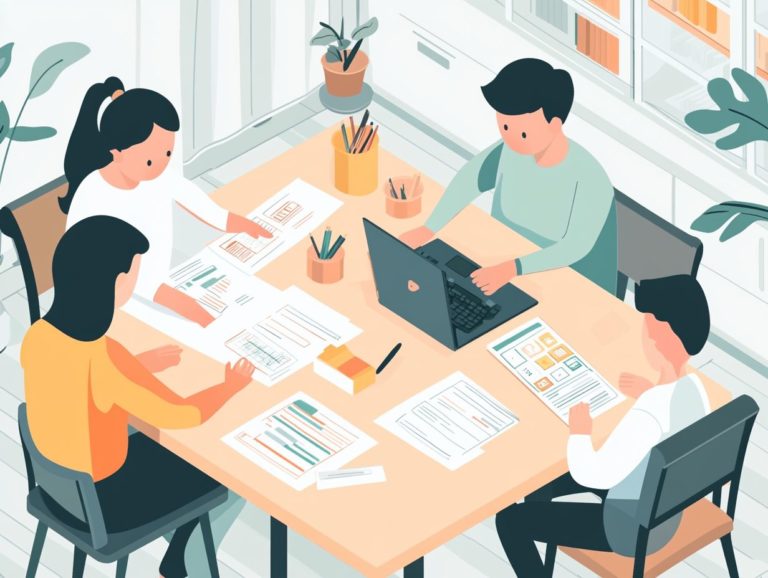What is the Freelancer’s Guide to Managing Late Payments?
Late payments can drain your finances and tarnish your professional reputation fast! This comprehensive guide explores the definition and common causes of late payments, their consequences, and effective strategies for prevention and management.
Topics covered include:
- The importance of a well-crafted bookkeeping contract
- The effective use of payment reminders
- Legal options for addressing unpaid invoices
Resources for implementing these strategies are included. The guide also offers tips for maintaining strong relationships with clients while minimizing the likelihood of future payment delays.
Contents
- Key Takeaways:
- Understanding Late Payments in Freelancing
- Impacts of Late Payments on Freelancers
- Preventing Late Payments
- Take Charge of Late Payments!
- Legal Options for Unpaid Invoices
- Resources for Freelancers
- Tips for Maintaining Positive Client Relationships
- Strategies for Avoiding Late Payments in the Future
- Frequently Asked Questions
- What is the Freelancer’s Guide to Managing Late Payments?
- Why is it important for freelancers to have a guide for managing late payments?
- What are some tips for preventing late payments?
- How can freelancers communicate with clients about late payments?
- What should freelancers do if a client consistently pays late?
- Are there any tools or resources available for freelancers to manage late payments?
Key Takeaways:
- Communicate clearly and have a solid contract in place to prevent late payments.
- Take action immediately when payments are delayed by sending a reminder and setting a new deadline.
- Know your legal options and be prepared to act if necessary to ensure timely payment.
Understanding Late Payments in Freelancing
Understanding late payments in freelancing is essential for maintaining financial stability and fostering positive client relationships. Late payments can significantly impact cash flow, creating challenges in managing financial obligations and affecting the overall profitability of freelance work.
Several factors contribute to late payments, including unclear payment terms, ineffective client communication, and misunderstandings related to project scope and billing processes. By identifying these issues, freelancers can develop effective strategies to manage late payments and preserve their business opportunities.
Definition and Common Causes
Late payments in freelancing refer to delays in receiving payment from clients that exceed the agreed-upon payment terms, posing challenges for financial management. These delays can result in cash flow issues, increased stress, and a deterioration of trust in client relationships.
Common causes of late payments often arise from vague contract terms that allow for interpretation, leading to misunderstandings regarding payment schedules. Additionally, insufficient communication between freelancers and clients can worsen these problems. For example, without clear payment reminders or notifications about upcoming invoices, clients may inadvertently overlook their financial obligations.
Utilizing invoicing tools can streamline this process, ensuring that freelancers receive timely payments while eliminating any ambiguity.
Impacts of Late Payments on Freelancers
Late payments can have significant financial and professional consequences for freelancers, complicating their ability to manage finances and maintain cash flow stability. When clients fail to pay on time, freelancers may face outstanding invoices, which can delay their ability to pay their own bills.
This not only impacts their cash reserves but can also damage their reputation with other clients. Ultimately, this affects their overall business opportunities. The stress of managing these delays may push freelancers to implement more aggressive strategies in the future, such as payment plans or late fees.
Financial and Professional Consequences
The financial and professional consequences of late payments often result in reduced financial security for freelancers, as well as reputational damage within the industry. Freelancers who receive late payments frequently face immediate financial challenges, including decreased cash flow that can hinder their ability to cover personal and operational expenses.
This situation may lead to late fees on their own bills and create a domino effect where missed payments result in breaches of contract with other clients. When late payments become a regular occurrence, trust can be eroded, increasing the likelihood of payment disputes that could escalate into legal issues. Ultimately, this tarnishes client relationships and future work agreements.
Establishing clear contracts is a crucial step in safeguarding against the negative impacts of financial insecurity.
Preventing Late Payments
The best way for freelancers to avoid late payments is through clear communication. Effective communication strategies and well-crafted contracts significantly reduce the likelihood of delayed payments.
Establishing detailed payment schedules and clearly outlining payment terms in service agreements helps freelancers manage client expectations. This minimizes the risk of payment disputes. Using invoicing tools can also help ensure timely payments.
Effective Communication and Contracts
Effective communication and clear contracts are essential for preventing late payments in freelancing. Open dialogue fosters healthy client relationships and ensures that all parties understand their payment obligations.
Freelancers should prioritize discussing payment terms early in project conversations. This includes covering acceptable payment methods, submission timelines, and payment schedules. Documenting these details in formal contracts that outline service agreements and specific payment deadlines can reduce misunderstandings later on.
Sending professional emails to reiterate these points reinforces expectations. It instills confidence in clients regarding the freelancer’s professionalism and reliability.
Take Charge of Late Payments!
While late payments can’t be completely avoided, freelancers can take proactive steps to manage them. This minimizes their occurrence and impact on cash flow.
When late payments do happen, freelancers should be prepared to respond effectively. This could involve sending payment reminders or negotiating a payment plan with the client. Staying organized through diligent invoice tracking and keeping well-kept records of communications provides valuable leverage in resolving payment disputes.
Know when to escalate issues. This may involve the process of recovering unpaid money or pursuing small claims court, which is a legal venue for resolving minor financial disputes.
Steps to Take When Payments are Delayed
Follow these powerful steps to get paid on time while maintaining professionalism:
- Send Payment Reminders to Clients: Payment reminders are an effective method for securing timely payments. Some freelancers feel uncomfortable reaching out about late payments. A good approach is to send a payment reminder email, serving as a polite yet firm reminder of the importance of prompt payment for the success of the working relationship.
- Assess Outstanding Invoices: Before contacting clients about delayed payments, freelancers should review their outstanding invoices. Ensure that all services rendered are accounted for and check for discrepancies that could prevent the client from making the payment.
- Follow Up Effectively: After sending reminders, freelancers must follow up effectively. Set calendar reminders for follow-ups after project completion. Use clear email subject lines (e.g., “Payment Request – Invoice #123”) and employ email templates. Establish expectations for follow-up actions if there is no response. Send follow-up emails at least every other week until payment is received.
- Seek Legal Recourse as a Last Resort: If previous efforts do not yield results, freelancers may need to consider legal options. Consulting with debt collectors or pursuing small claims court should be viewed as a last resort for recovering payments.
Legal Options for Unpaid Invoices
Freelancers dealing with unpaid invoices have several legal options for pursuing payment. It is crucial to understand these options, especially after other attempts to resolve the issue have failed.
Legal avenues may include:
- Sending final notices
- Engaging a debt collection agency
- Filing claims in small claims court for unpaid invoices
By being informed about their legal rights and the frameworks surrounding freelance contracts, freelancers can take swift action to protect their interests.
Resources for Freelancers
Freelancers have several legal options available to address unpaid invoices and resolve payment disputes. One option is to file a complaint with consumer protection agencies, which can offer guidance and investigate issues related to payment disputes.
Another approach is to work with a company that helps recover unpaid money, which specializes in negotiating collections on behalf of freelancers to recover owed money. Mediation (a way to resolve disputes with a neutral party) and arbitration (a process where a third party makes a decision) services provide a structured process for resolving disputes without resorting to court proceedings.
These legal options enable freelancers to assert their rights and ensure fair treatment in business transactions.
Tips for Maintaining Positive Client Relationships
Building positive client relationships is essential for freelancers and can significantly reduce the likelihood of late payments. By implementing effective strategies and maintaining professionalism, freelancers can foster trust and enhance communication with their clients.
This includes setting clear expectations, keeping clients updated on project milestones, and sending follow-up emails as reminders for upcoming payments.
Strategies for Avoiding Late Payments in the Future
Freelancers can prevent late payments in the future by employing strategies that promote clear communication and set expectations with clients. One effective approach is to establish a transparent payment schedule that outlines when payments are due, thereby encouraging accountability.
Clearly specifying payment terms in contracts can significantly reduce misunderstandings and ensure that both parties are aligned from the outset. Frequent communication, particularly through professional emails, enables freelancers to remind clients about invoices and upcoming payment deadlines.
By implementing these strategies, freelancers can better manage their financial situations and cultivate a reliable working relationship, ultimately reducing the stress associated with financial uncertainty.
Frequently Asked Questions
What is the Freelancer’s Guide to Managing Late Payments?
The Freelancer’s Guide to Managing Late Payments is a comprehensive resource that provides tips, strategies, and tools for freelancers to handle late payments from clients. It offers guidance on how to prevent late payments, communicate with clients about late payments, and what to do if a client consistently pays late.
Why is it important for freelancers to have a guide for managing late payments?
Freelancers often rely on timely payments from clients to maintain their cash flow and pay their bills. Late payments can cause financial strain and disrupt the freelancer’s business. Having a guide for managing late payments can help freelancers avoid these issues and maintain a healthy business.
What are some tips for preventing late payments?
- Set clear payment terms at the beginning of a project.
- Send timely and professional invoices.
- Offer incentives for early payments.
- Establish a contract with clients that outlines consequences for late payments.
How can freelancers communicate with clients about late payments?
Finding the right way to communicate with clients about late payments can be tricky. Some tips for navigating this conversation include staying calm and professional, reminding the client of the agreed-upon payment terms, and offering alternative payment methods or payment plans if necessary.
What should freelancers do if a client consistently pays late?
If a client consistently pays late, it may be necessary to take more serious action. This could include charging a late fee or seeking legal assistance. The Freelancer’s Guide to Managing Late Payments offers advice on how to handle these situations and protect your business.
Are there any tools or resources available for freelancers to manage late payments?
Yes, many tools can help freelancers manage late payments. These include billing tools that automatically remind clients and pre-made agreements that clearly outline payment terms.
Consider using legal services that assist in collecting overdue payments. Be sure to check out the Freelancer’s Guide to Managing Late Payments for a list of recommended resources!










